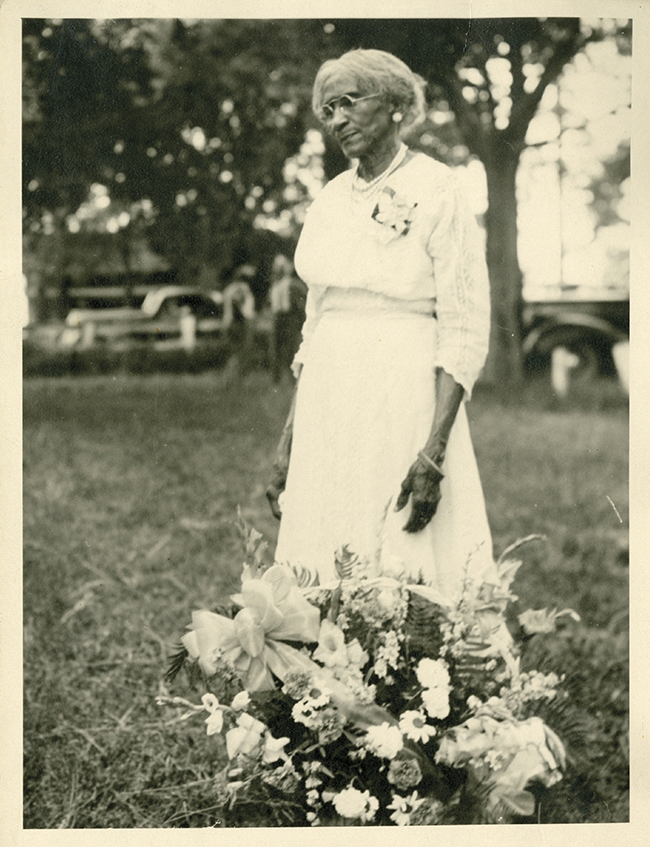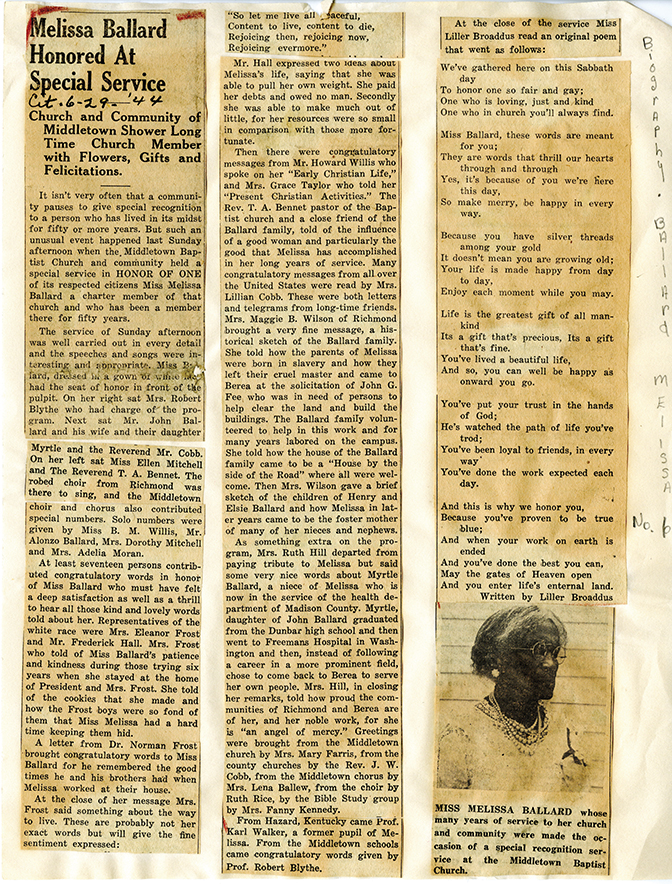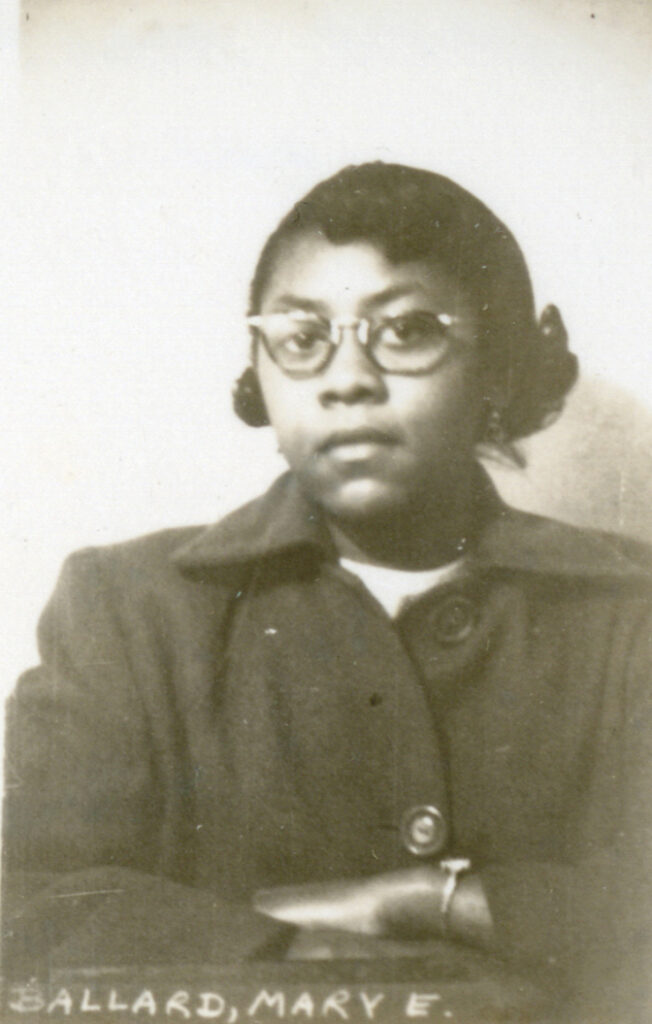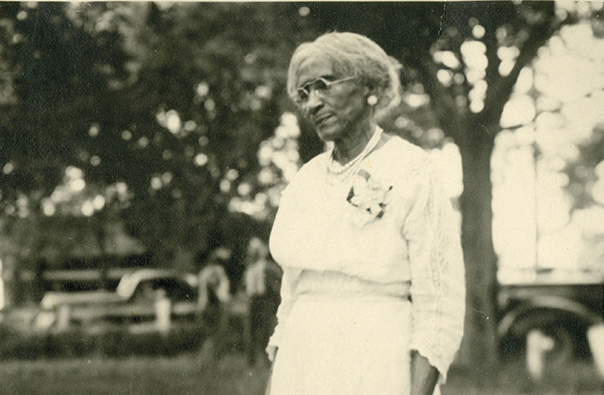Church and Community Shower Long Time Church Member with Flowers, Gifts and Felicitations.
Berea Citizen newspaper; June 29, 1944

Miss Melissa Ballard, 79, sits in the front row of First Baptist Church of Berea, Ky. Friends and extended family fill the seats on either side of her. A few weeks earlier, the church, of which she is a founding member, celebrated its 50th anniversary.
Miss Melissa is not used to being the center of attention. She is the planner, the worker, the one who sees that things get done. At least 17 people are expected to speak, and Miss Melissa can’t imagine what all of them will have to say. She will, though, look forward to the choir music and to the five soloists. She settles in, back straight, and waits.
Mrs. Frost, the wife of one of Berea College’s presidents, tells of Miss Ballard’s patience and kindness during those trying six years when she stayed at their home. She tells of the cookies that Miss Melissa made and how the Frost boys were so fond of them that she had a hard time keeping them hid.–
Berea Citizen newspaper; June 29, 1944
Miss Melissa smooths the front of her new white dress and gently waves her paper fan. The church behind her feels full, and it seems like not a single bit of air is moving.
She remembers those Frost boys descending on her freshly baked, still- warm cookies. And she remembers staying at their home when she cooked, cleaned and kept an eye on the younger children. All her life, she has lived with family members. Those six years with the Frosts were the longest time she did not go home to family at night.
Miss Melissa has been cooking for as long as she can remember. In her large family, there was always the need for food, lots of it, and there was never enough money. Her Papa grew corn, so there was always meal for corn bread. Once in a long while, he would bring home flour, and Mother taught her how to make fluffy biscuits. Each child got two, and Melissa let each bite melt slowly on her tongue before taking more.
She closes her eyes and smiles at the thought of those biscuits.

When Miss Melissa started cooking for college professors and their families, their big kitchens and full pantries left her speechless. Before she worked for the Frosts, she had spent many years cooking for Professor Le Vant Dodge’s household. For much of that time, their niece lived with them. Miss Melissa never had children of her own, but she helped with the raising of her brothers and sisters, nieces and nephews, and the children of the families she worked for. So many children over the years.
In the summer of 1910, Professor John Dinsmore and Mrs. Martha Dinsmore took her with them to a cottage on one of the Apostle Islands in Northern Wisconsin. She fished in the clearest water she had ever seen. The quiet was complete, and it reminded her of the apostle John, also a fisherman. She wondered whether he had experienced this peace and solitude when he was banished to the remote island of Patmos. While she was still in Wisconsin, she began to shape stories in her mind. She loved to tell her Sunday School pupils about the people in the Bible, and she liked to connect those stories to the present day.
Then there are congratulatory messages from Mr. Howard Willis who speaks on her “Early Christian Life” and Mrs. Grace Taylor who tells about her “Present
Berea Citizen newspaper; June 29, 1944
Christian Activities.”
Miss Melissa recrosses her ankles. She inhales the sweet scent of her gardenia corsage and pats her hair, which her niece, Myrtle, washed and styled for her on this special day.
She thinks of that meeting in the fall of 1894, when she, her sisters, Emily and Matilda, and three of her brothers joined 60-some other Berea folks with the idea of building a church closer to their homes.
The Negro Baptist families of Berea had been attending New Liberty, seven miles away. Each week, they walked there and home. In mild weather, they wrapped their shoes in paper and walked barefoot. When they caught sight of the church, they stopped to wipe the dust off their feet and put on their shoes before entering. Four years after that meeting, this very building was dedicated: First Baptist Church of Berea in Middletown. It was less than a mile for most folks to walk.
Miss Melissa nods her head each time the speakers mention one of the things she has done at this church. She served as treasurer for a time. She has always been good with money: keeping track of it, making the most of it and encouraging folks to donate for a good cause, no matter how small the amount.
She has taught Sunday school, led Bible study and Baptist Training Union meetings and arranged flowers for the altar. She often uses her own flowers, and she has won awards for her garden.
Always, it seems, she is planning and cooking for basket dinners or other church programs. She remembers the homecoming her church held for the Negro World War I soldiers in October 1919. As always, there was food, so much food, which she organized, and a program of speeches and music. Her younger sister, Matilda, sang “They Ain’t Going to Study War No More.” More than 200 people attended.
Mrs. Maggie B. Wilson of Richmond brings a very fine message, a historical
Berea Citizen newspaper; June 29, 1944
sketch of the Ballard family.
Miss Melissa’s parents remember her birthday as Oct. 8, 1864. Her first real memory, or maybe it’s something she was told over and over again, is of her parents going to Camp Nelson to get their freedom papers at the end of the Civil War. They had been enslaved on different plantations, and Mother always said that when she and Papa got their freedom, they had nothing except each other and a bunch of children. There were 15 in all, some born after freedom, some already grown and out of the house, and one boy, Joseph, who died when he was just 8 months old.
After they got freedom, Papa and her older brothers got jobs working for Reverend John Fee, the founder of Berea College, putting up campus buildings. Papa made 75 cents a day, and Mother sometimes did wash for the college people for 50 cents a day. The Ballards were the first Negro family to buy land and build a home in Berea.
The Fees had settled in what was then called The Glade. It was mostly forest, farms and a few mud roads, but Reverend Fee had a vision for a community where both races would live together, and a school where both would learn together.
Miss Melissa hears Mrs. Nelson saying the Ballard place was a house by the side of the road, where everyone was welcome.
And that it was. Their small log cabin was already overflowing with family, but there was always room for someone passing through to stay the night or just share a meal. Sometimes, the men who were hired to work on the new college buildings boarded with the Ballards.
Her parents never let the children know about money worries, but Miss Melissa also recalls that she and her brothers and sisters didn’t play outside much during the month of March. It was still cold, and the shoes they each got once a year were worn out by that time. Sometimes, though, they did venture out, and they made a game out of cracking the ice in the puddles with their bare feet. At night, after washing up, their feet would be sore and cracked, and Mother would dust them with soothing corn meal.
Then it was time for rest. Melissa and her two younger sisters slept in a trundle bed, two at the head, one at the foot. During the day it was pushed under a bigger bed, out of the way. Her brothers slept in the loft of the cabin.
Miss Wright from the College has asked Miss Melissa to write down her memories of her childhood for a book about Berea in the early days. She has pencils and a ruled tablet, and she writes whatever comes into her head. She has filled 12 pages, more writing than she has done in a long time, and she is not done yet.
Just last night, she wrote about the rough, damp grape vines she pulled from the trees in the woods so she and her sisters could jump rope with them. She is starting to wonder if Miss Wright will use all these memories. More than once, Miss Wright has asked, “Are you sure this is the way it happened?”
Miss Wright cannot know the way time folds in on her when she thinks of those days, when her family was together under one roof and free for the first time. Miss Melissa will never forget them, no matter how long she lives.
From Hazard, Kentucky comes Prof. Karl Walker, a former pupil of Melissa.
Berea Citizen newspaper; June 29, 1944
Miss Melissa is tired now but happy to see one of her best Sunday school students. Karl Walker attended the Kentucky Normal and Industrial Institute for Colored Persons in Frankfort, and now he is the principal at Liberty High School in Hazard.
Miss Melissa thinks of those early days of Berea College when Rev. Fee made sure there were classes for younger children, and those who had not been able to attend school before the Civil War. He insisted that Negro and white children learn side by side. At one point, the white parents refused and took their children home, but Reverend Fee said it was up to them. After a while, the white children came back, and everyone got along just fine.
Her parents had seen to it that all of their children, except the eldest, who was already out and on his own, attended school. She will always remember the day in 1894 when her sister, Matilda, learned she had passed the exam for her teacher certification. Her name was in a list printed in the Richmond newspaper, and Miss Melissa cut it out and slipped it in her Bible.
In 1904, Kentucky passed the Day Law, making it illegal for both races to attend the same school. Senator Carl Day, who proposed the law, said it was for the purpose of “preventing the contamination of the white children of Kentucky.”
The Berea College trustees chose to admit only whites and to assist the current Negro students with financial aid to go to other schools. Plans were made to open a college for Negro students near Berea, but that turned out to be more difficult than expected.

In the fall of 1911, Miss Melissa, her niece, Ada, and other promoters of the Lincoln Institute for Colored Youth took the early train 92 miles away to the farm where the institute was being built. After a picnic dinner, they spent nearly four hours touring the buildings that had been completed, and the others that were under construction, a total of nine in all. It was a long, hot day, but they all came back to Berea satisfied with the progress. They signed a letter to the newspaper saying so. The Institute opened 13 months later, eight years after the Day Law was passed. Now, 32 years later, it is still a fine school, but a college program has yet to be added.
At the close of the service Miss Broaddus reads an original poem.
Berea Citizen newspaper; June 29, 1944
The poem is lovely, but makes it sound like Miss Melissa has already passed, what with phrases like, “may
the gates of Heaven open.”
When the service ends, Miss Melissa gets up more slowly than usual; she has been sitting a long time, and she has never been one to sit much. As she turns around, she sees there are no empty seats, and folks are standing in the back. She is surrounded by kith and kin. Her heart is full.
Miss Melissa lived for five more years. Just a few days before her passing, she was preparing for a Kiwanis dinner at her church.
The next year, 1950, the Day Law was amended and, for the first time in 46 years, Black students were once again admitted to Berea College. Miss Melissa’s great-niece, Miss Mary Elizabeth Ballard, was one of those students.
Miss Melissa Ballard’s handwritten memories of early Berea remain in the College archives, unpublished.
Finding Miss Melissa
After submitting an essay to the Appalachian Review, Berea’s literary magazine, author Melissa Ballard was compelled to learn more about Berea. She stumbled across her name in a website description, thinking it was a link to her essay. Instead, she learned about Miss Melissa Ballard, born in 1864, and immediately got the sense she was an important woman in her community. With nothing to connect the two except sharing a name and being from Appalachia, Ballard set out to learn more about Miss Melissa Ballard of Berea, Ky., and to write about her.
Researchers in Berea’s Special Collections and Archives assisted the author. Many coincidences kept her motivated as she continued her research: Miss Melissa’s father’s first name was Henry; that was the last name of Ballard’s father. In the 1910 census, Miss Melissa was living with her sister, Emily, who had a daughter, Ada. Ballard has a daughter named Emily, and Emily has a daughter named Adah.
After a year of research and transcribing pages of Miss Melissa’s hand-written memories, while silently meditating, Ballard says she heard the words, “Just tell my story; I’ve already started it for you.” Ballard tried writing Miss Melissa’s story in several ways before deciding to follow the order of service for the 1944 Special Service honoring Miss Melissa. She imagined, based on her research, the thoughts and memories Miss Melissa might have had during the service. Throughout the process, Ballard said she felt guided and “nudged to write,” and she tried to listen, trust and honor everything she was given.
Special thanks to Sharyn Mitchell, research services specialist, and Elizabeth Ballard Denney.



I read this in the paper version of the Berea Magazine. It was such a wonderful article and thought one of my High School friends who is from Berea and has family in Middletown would enjoy seeing this and thought it would be great to forward it via Messenger… imagine my dismay and downright displeasure at seeing a key piece of the article missing in the on-line version!! Where is the picture of the Newspaper Article?!! That is such an integral part of this story and what I really wanted my friend to see as it mentions some of her… Read more »
Thank you so much for noticing the missing article! I will add it and let you know it’s there!